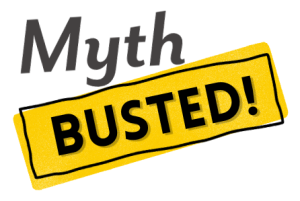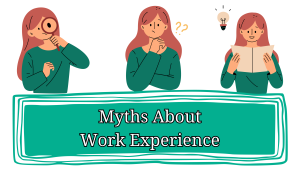
Unfortunately there are many myths out there about the clinical psychology doctorate, and what is expected of you. There are a lot of different experiences and stories, and people find themselves on this career path for all different reasons in many different ways. We wanted to share with you some of the often told myths and show you why these are simply not the case.

You must have work experience with a clinical psychologist to get onto the course.
- This is one myth that is course dependent. Some courses will say they want applicants to have experience with working under a clinical psychologist, and other courses may mark experience more favourably if this is had. It is important to look at the courses you are applying to, to see if this is a requirement.
- Some courses state that they do not require clinical experience. For example, Hull and York offer a pathway for people who are completing an undergraduate with them. Lancaster do not look at prior experience through the selection process. And other universities have similar approaches.
- When considering your application form, it is better to think of the skills and competencies you have gained from your experiences. Having shadowed a clinical psychologist may give you insight into the day-to-day role of that psychologist in that service, but it doesn’t tell courses anything about you. On the other hand having experience in retail that you can reflect on and learn from, may offer some insight into who you are as a person and professional. We’re not suggesting we all gain experiences from retail, rather it is about what you can learn from and take forward from the experiences you do have.
You must have NHS experience.
- Very similar to the myth above, some courses do like you to have this however it is not a requirement for every course. We would encourage you to look deeper into the courses you are applying to. They will set out their values and entry requirements which should help you see if this is the course for you.
You must have experience in everything to get on. You need to have worked in various settings.
- Having experience in everything is definitely not necessary. It’s important to think about the skills and experience you have and how you can apply them. The training will expose you to all the elements needed to become registered with the HCPC. There is a vast scope for a clinical psychologist and the role has so many elements. Its more helpful to think of the transferrable skills and the relevance of your experience.
- It would also be helpful to look at the individual courses and have a look at what they value and what they are looking for. This can help you see and understand if you would enjoy that university, whether they share your values and have an ethos that aligns with you.
It is impossible to get on the course without AP experience.
- Whilst some courses may prefer clinical experience under a clinical psychologist or within the NHS this is not true to all courses. It would be good to take a look on the clearing house webpage or the individual courses websites and see what their entry requirements are.
- It’s also worth noting that no experience is invaluable, all our experiences are learning opportunities and it’s important to recognise and reflect on what we have learned and how it has developed us.

You need to have a first-class degree to get on the course.
- It would be helpful to take a look at the individual courses. Whilst some may favour or require a first class or upper 2:1, there are many courses for which this is not a requirement.
- Some courses request postgraduate qualifications to supplement a low undergraduate grade to show academic ability. However, there are also courses who do not consider the undergraduate grade and use other selection methods in considering your application.
You need post graduate qualifications i.e., master’s or PhD.
- It is not a requirement for any post graduate qualifications on any course unless otherwise specified (e.g. based on undergraduate/conversion etc). Some people may choose to pursue postgraduate qualifications due to a variety of reasons, this may be due to their undergraduate grade (*see individual courses and above myth for more information), interest in a subject area, being misinformed that it is a requirement, as a conversion to obtain GBC, or for further experience.
You need to have had work published.
- On the application form there is a section asking about any publications and disseminations of your work. However please don’t let this panic you! A key aspect of clinical psychology is thinking about dissemination of information (I.e. how do we share what we know) this can absolutely include publishing resources, but that is just one aspect or example of this. There are many ways we can disseminate information, including training, resource creation, service audits, and many others. Having a publication may offer you insights into the process when you are training but it is not a requirement (unless otherwise stated by a specific university) and in fact there are only a small percentage of candidates who will have published work.

You’re too young or too old to apply.
- There is no age limit on starting this career, on average people get onto the course in their later twenties. However, there is often variety in ages. People can often make career changes or decide to pursue clinical psychology later in life. Your experience and knowledge will be invaluable.
- As long as you meet the minimum requirements of having completed an accredited undergraduate or relevant conversion course that makes you eligible for Graduate Basis for Chartered membership (GBC) from the British Psychological Society (BPS). If you have completed a non-GBC accredited course, you can apply for GBC by completing a conversion course.
You must pay for a BPS membership in order to apply.
- When applying for the DClin, you will be asked to submit evidence of your eligibility for GBC. One way in which people can evidence this is by a letter from the BPS confirming your eligibility. However, it is also possible to obtain this evidence directly from your university. You can check if your course is accredited by the BPS here ( BPS > Accredited Courses )
I must pay for a mentor to get onto the course.
- There are beliefs that people who have a mentor or have been coached by someone are more likely to get a place. We want to first start by saying that whilst you don’t need this, it is helpful to know more about the profession. There are loads of free resources available. It is important to consider if these are useful and helpful. You can use the Resource Appraisal Tool to help guide your thinking around this.
- As for paying for the mentorship, there are many people who offer their support for free. People who want to support you and will volunteer their time to support you. It can be helpful to reach out to trainees, or qualified staff at your respected courses of interest, or look at what information is out there. There is no direct advantage to paying for the mentorship. Your application is about you, and it’s not possible to teach someone about themselves, what may be more helpful is getting an insight into the courses, their ethos, and how their values align with your own.
You have to put your life on hold and dedicate all your time to applying for the course.
- Oh, how I wish someone had busted this myth for me! You absolutely do not need to put your life on hold. The DClin is a stressful and difficult journey but you are more than the job you are applying to. Of course, you are in the best position to decide what sacrifices you want to make, but what I have learnt is that if it feels like a sacrifice, sounds like a sacrifice, smells like a sacrifice, then we need to ask, “is it worth it”. Don’t miss out on memories and living because of writing an application form. Find that balance. Stay organised and manage your time but please don’t let that time be overwhelmed with the application. Take some time out to rest and enjoy. Big life decisions are often hard when thinking about applying, but you need to think about what is right for you and what you need.
Your application needs to be filled with buzzwords and psychology jargon
- Buzzwords and jargon don’t mean anything without real understanding and reflection. Don’t worry about having the most psychological sounding application form, rather focus on showing the reader who you are and what’s important to you. What have you learnt?, who are you?, what will you bring to the profession?
- If there are buzzwords or jargon that feel applicable don’t be deterred from using them, but it’s important that you write about you and not a psychologically framed analysis of you.

